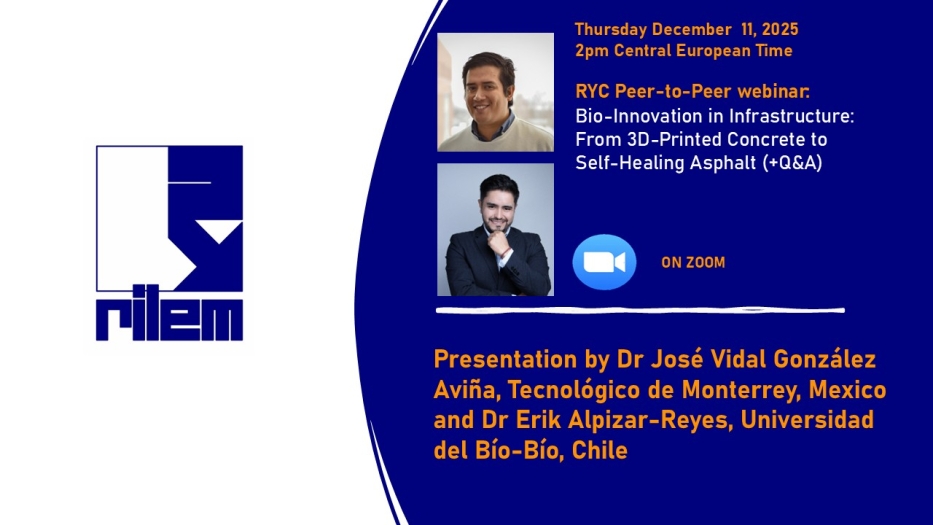The next Peer-to-Peer webinar will take place on Thursday December 11, 2025 at 2pm Paris Time and will be one hour long (2*20 minutes presentations + 15-minute interaction). The registration for this webinar is free.
REGISTER FOR FREE HERE.
Theme of the Peer-to-Peer Webinar: Bio-Innovation in Infrastructure: From 3D-Printed Concrete to Self-Healing Asphalt
Host: Julian Camilo Gutierrez Rodriguez, PhD candidate, Universidad Nacional de Colombia-Universidad Autónoma de Nuevo León, Colombia
Co-Host: Dr Liam Martin, Research Engineer, University of Technology Sydney, Australia
Speaker 1: Dr José Vidal González Aviña, Professor, Department of Sustainable and Civil Technologies, Tecnológico de Monterrey, Mexico
Title 1: Biopolymers for the Rheological Optimization of 3D-Printed Concrete: Innovations, Challenges, and Future Perspectives
Biopolymers have a role to play in optimizing the rheological behavior of cementitious materials extrusion-based 3D concrete printing (3DCP). 3DCP has gained global relevance due to its potential to improve construction efficiency, reduce material waste, and enable the fabrication of complex geometries without formwork. Achieving proper rheological control is essential, as the material must be pumpable, extrudable, and capable of maintaining its shape after deposition. This presentation highlights the potential of biopolymers, which are renewable, abundant, and environmentally responsible admixtures, to improve critical fresh and early-age properties of concrete. A comprehensive overview of various biopolymers, their preparation methods, and their interactions with superplasticizers, along with their effects on structural build-up, stability, and strength development are discussed. An outline of the formulation of biopolymer-modified mixtures for three-dimensional concrete printing and their performance throughout the printing process, including pumping, extrusion, and layered deposition is evaluated.
Speaker 2: Dr Erik Alpizar-Reyes, Assistant Professor, Department of Process and Bioproducts Engineering at Universidad del Bío-Bío, Chile
Title 2: Plant spore-based microcapsules for controlled release in asphalt self-healing
The maintenance and repair of road infrastructure are major challenges in terms of economic costs and carbon emissions. This presentation introduces a biomimetic approach where the unique microporous structure of plant spores (Lycopodium clavatum) is used for the encapsulation and controlled release of rejuvenating oils in bituminous materials. These bioinspired structures, characterized by their exceptional thermal stability and mechanical properties, can function as encapsulation systems for rejuvenating agents in aged asphalts. The acidolysis processes for sporopollenin conditioning, their characterization through advanced analytical techniques, and the diffusion mechanisms that enable the controlled release of the encapsulated material for crack sealing in aged bituminous matrices is discussed. This approach intends to offer potential reduction in maintenance costs and associated carbon emissions.

